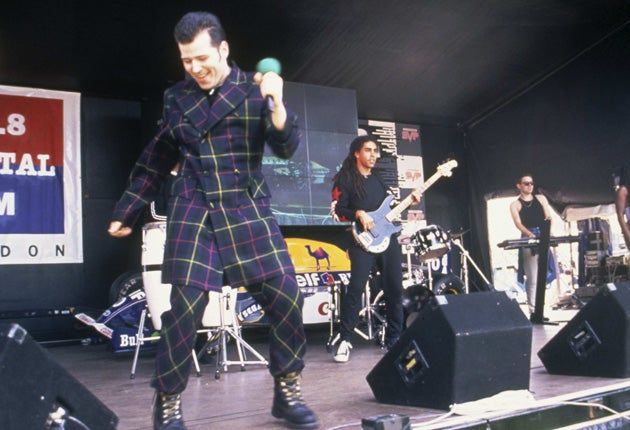It's sex and drugs and particle physics as D:Ream star recreates the Big Bang

Your support helps us to tell the story
From reproductive rights to climate change to Big Tech, The Independent is on the ground when the story is developing. Whether it's investigating the financials of Elon Musk's pro-Trump PAC or producing our latest documentary, 'The A Word', which shines a light on the American women fighting for reproductive rights, we know how important it is to parse out the facts from the messaging.
At such a critical moment in US history, we need reporters on the ground. Your donation allows us to keep sending journalists to speak to both sides of the story.
The Independent is trusted by Americans across the entire political spectrum. And unlike many other quality news outlets, we choose not to lock Americans out of our reporting and analysis with paywalls. We believe quality journalism should be available to everyone, paid for by those who can afford it.
Your support makes all the difference.A decade ago, he was playing keyboards for the pop band D:Ream at the 1997 victory party of New Labour at the Royal Festival Hall.
Next week, he will be the photogenic face of particle physics when the biggest experiment on Earth is switched on in Geneva.
It is a long way from singing the Labour Party anthem "Things Can Only Get Better" to tangling with the fundamental forces of nature but, for Professor Brian Cox of Manchester University, the opening of the Large Hadron Collider will mark the pinnacle of a scientific career that began with a first class physics degree in the mid 1990s, at the same time as he was appearing on Top of the Pops.
Professor Cox, 40, said yesterday that he does not have much time for music nowadays given his involvement in the huge international project that aims to recreate the conditions of the Big Bang, when the universe began some 13.7 billion years ago.
He is one of more than 6,500 scientists from 500 research institutes in 80 countries who have collaborated on the building of the highly complex experiment, which involves spinning beams of sub-atomic particles in opposite directions before deliberately colliding them together in an underground tunnel 27km (16.8 miles) in circumference.
They hope to resolve one of the biggest questions in physics: how are matter and the forces of nature linked together.
By colliding a type of sub-atomic particle known as hadrons at 99.999999 per cent of the speed of light, the scientists hope to go back to the first billionth of a second after the Big Bang, when weird things happened to matter and the fundamental forces of nature.
Suggestions that the machine might result in the creation of a giant black hole have been ridiculed by all involved.
"I'm quite a believer that science should be part of culture as well as being useful in its own right," Professor Cox said. He will be sitting alongside Andrew Marr next Wednesday morning to present Radio 4's Today from the control room of the Large Hadron Collider.
"Particle physicists are nothing if not ambitious. They aim to understand what everything is made of and how everything is stuck together – from atoms to galaxies," he explained.
At present, scientists know of 12 sub-atomic particles of matter and four fundamental forces holding them together but, by recreating the earliest conditions of creation, they hope, for instance, to find the elusive Higgs boson, a theoretical particle that could explain the force of gravity.
The core of the Large Hadron Collider is its underground tunnel that snakes beneath the Franco-Swiss border. Giant supercooled magnets kept at temperatures just above absolute zero, -273C, are designed to accelerate the beam of hadrons to immense energy levels before slamming them into one another.
Detectors, some weighing 7,000 tonnes and measuring five storeys high, will try to pick up any unusual signals or particles that emerge from these collisions.
Join our commenting forum
Join thought-provoking conversations, follow other Independent readers and see their replies
Comments